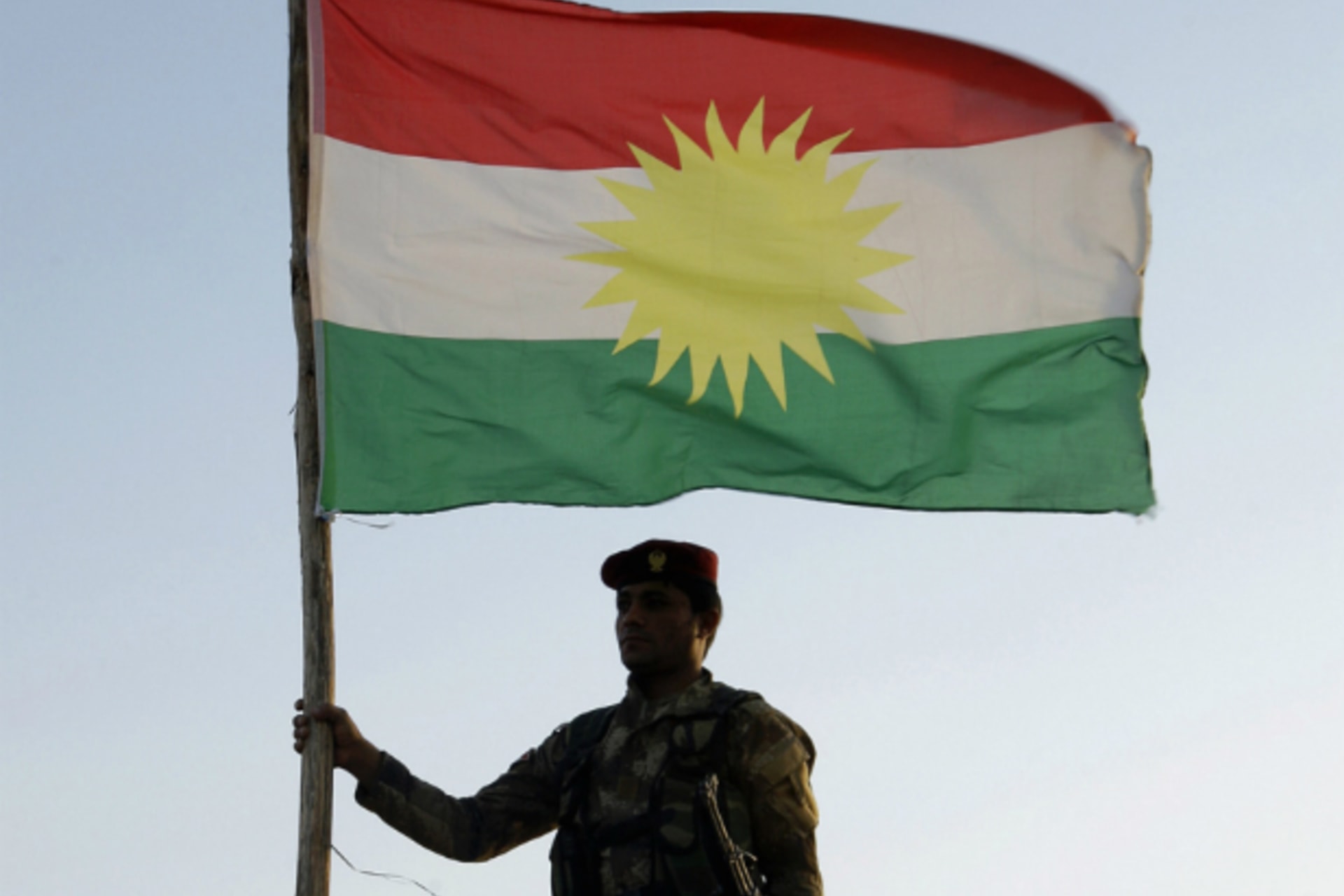Kurdistan: Just Being Independent

By experts and staff
- Published
Experts
![]() By Steven A. CookEni Enrico Mattei Senior Fellow for Middle East and Africa Studies
By Steven A. CookEni Enrico Mattei Senior Fellow for Middle East and Africa Studies
Iraq is going to break up. It is already happening, but no one wants to acknowledge it because no one wants to be perceived as being responsible for the disintegration of a major Middle Eastern country.
There is not much about the Kurdish region of Iraq that is Iraqi. When you arrive at Erbil’s brand new international airport, there are no signs that welcome you to Iraq. I am sure somewhere at the entrance to the airport there is an Iraqi flag, but I didn’t notice it. The only hint that I was actually in Iraq was the stamp a Kurdish police officer put in my passport that says in tiny letters, “Republic of Iraq—Kurdistan Region.” The Kurds have a foreign ministry (actually two, maybe even three, but that is another story), a military, interior ministry, intelligence services, a parliament, president, prime minister, investment authority, and a flag. No one under the age of 30 speaks Arabic (English being the favored second language) and not a single person I met of any age believed themselves to be Iraqi. Why would they? What is the common idea that ties someone from Sulaimaniyah to someone in Basra? There isn’t one.
None of this should be much of a surprise to anyone who has even been paying half attention to Iraq over the last decade—or rather the last two decades when the Kurds quietly began building the institutions and structures of independence under the Anglo-American no-fly zone established after Operation Desert Storm. Beyond solemn declarations that, “the Kurds will not be responsible for breaking up Iraq” and not-so-believable assertions about the differences between “the dream of independence” and the constitutional reality of a unified Iraq, you get the sense that the Kurds believe that the environment for their independence is slowly ripening. They have serious reserves of oil and gas as well as significant amounts of foreign direct investment from Turkey, the Gulfies, Lebanon, Egypt, the United States, Europe, and the Russians. A lot of investment is in the energy sector, but not all of it. There are, for example, more than 1,000 Turkish companies—both large and small—operating in the Kurdistan region. Kurds are munching on Ulker biscuits, cooling off during the brutally hot summers with Arcelik air conditioners, and I stayed in the Koc family’s Erbil outpost—the Divan Hotel. Speaking of Erbil, it is a bit dreary, but definitely booming. The most oft-sighted bird in the Erbil sky is the “construction crane.”
Combined with good economic times in Kurdistan is the pervasive dysfunction in Baghdad and the sectarian violence that threatens to tear the country apart. Just yesterday (Sunday) there were ten bombings killing at least forty-one in Shiite majority areas of Baghdad. The death toll is up to 1,000 a month, which is not quite 2006 levels, but close. In contrast, the Kurdish area has experienced three bombings in the last decade, the most recent on September 29, the first major attack since 2007. In addition, the Kurds and the federal government—officials in Erbil chafe at the term “central government”—are forever in conflict over the electoral law, hydrocarbon law, and the Kurdish share of the budget, which is supposed to be 17 percent, but is always less. People in Erbil and in Baghdad, I am told, wonder whether the effort to maintain the fiction of a unified, federal Iraq is worth it both politically and economically.
As good as it looks for the Kurds, they still have serious challenges before realizing their ultimate goal. The first is Kirkuk. The oil-rich region around the disputed city is in the central government’s hands, but the disposition of Kirkuk remains a powerful nationalist issue for Kurds. There have been censuses in the city in 1957, 1977, and 1997. And while there is agreement that the 1957 tally was the most accurate, no one actually knows the current demographic balance of the city. In the 1980s and 1990s, the Arab population surged as a result of Saddam Hussein’s Arabization policies and there continues to be a large Turkoman population that claims Kirkuk to be culturally Turkoman rather than Kurdish. Even if the non-Kurdish populations were considerably smaller, Kirkuk remains in the hands of Baghdad and there is no way the Kurds are going to “liberate” it without force, something that seems farfetched despite the apparent bravery and legend of the peshmerga. At least one Kurd said to me, “If we have a lot of oil and gas in other places, we do not really need Kirkuk.” He freely admitted that his view was not widespread.
Second, the Kurds have their own internal political difficulties. Despite burying the wounds of a civil war they fought in the mid-1990s, it is clear that the two parties that have controlled the Kurdistan region—the Patriotic Union of Kurdistan (PUK) and Kurdish Democratic Party (KDP) eye each other warily. The PUK has largely controlled Sulaimaniyah, though a breakaway party called Ghorran (meaning, change) secured more votes than the PUK in recent elections. The KDP has a virtual lock on Erbil and Dohuk, the other governorate that makes up the Kurdistan region located next to most of the Turkish border. The KDP and PUK form a governing coalition, but cooperation between and even within ministries between party members can be tough going. There are other more ominous outward differences. The security forces in Erbil, for example, wear different uniforms than those in Sulaimaniyah, which would not be a problem but for the fact that my non-government Kurdish interlocutors impressed upon me that these groups are loyal to different and competing power centers.
Finally, even though the Kurds insist they will do nothing to break up Iraq, they want others—especially the United States—to approach the region in a way that reinforces the idea of the inevitability of Kurdish independence. Yet for political reasons Washington will resist deviating from its “one Iraq” policy. This, of course, produces policies that are incongruous with reality, but when has that ever stopped Washington? My favorite example is the American effort to encourage better relations between Ankara and Erbil. There was a time not too long ago when observers feared that Turkey would invade Iraq to snuff out Kurdish independence. In order to forestall such an event, the United States has encouraged Ankara to shift its approach to the Kurdistan region and since 2008 the Turks have developed (as noted above) strong economic ties with the Kurds. A great American diplomatic success, except that it is apparently too much of a success. Washington now wants the Turks to back off of a deal that would send Kurdish oil directly to Turkey, bypassing the Kirkuk-Ceyhan pipeline that Baghdad controls. Why? Because the Turkish-Kurdish deal would demonstrate that the Kurds can act independent of Baghdad.
Unlike the first two challenges to Kurdish independence, Washington’s position is a complication not a potential obstacle. Yet even accounting for Kirkuk and internal rivalries, it is likely that one day everyone is going to wake up and there will be a new country called Kurdistan. The Kurds will not have to declare independence, they won’t dance in the streets, there will not be a need for fireworks, or a founding date, though I am sure someone will make one up so future Kurdish embassies can invite people to their national day celebrations. No, the Kurdish state will just come into being. It is already happening.
